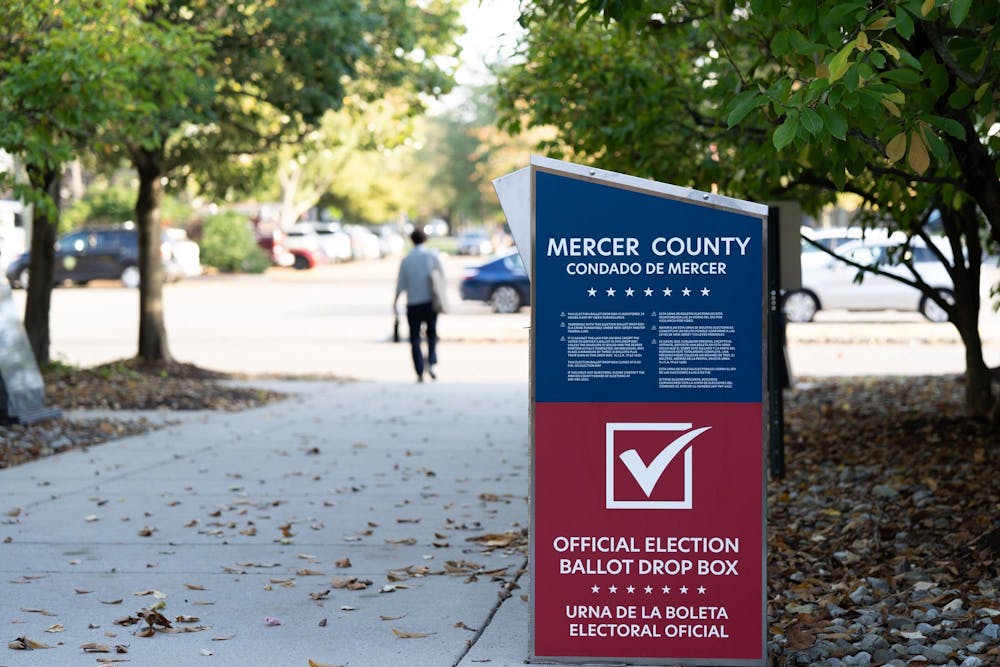Election Day is five weeks away. We all know of the importance of voting, especially in today’s political environment. Indeed, the University has demonstrated its commitment to encouraging students to carry out their civic duty with the Vote100 initiative, a project of the Office of the Dean of Undergraduate Students. Although college students can vote where they study, Princeton students should choose to vote absentee from their hometowns rather than voting here in New Jersey.
New Jersey, and Princeton in particular, is exceptionally blue. The Democratic Party has held majorities in the state legislature for over twenty years, and Democratic Governor Phil Murphy handily won re-election in 2021. Princeton is the most Democratic town in Mercer County, where 55 percent of registered voters are Democrats and only 12 percent belong to the Republican Party. The results of the 2020 election demonstrate the dominance of Democrats here in Princeton. 11,858 voters voted for Joe Biden, while only 1,981 votes were cast for Donald Trump. This wide margin means that if even all 5,000 Princeton undergraduates registered to vote here in Princeton and universally voted for Trump, the outcome of the election in the Municipality of Princeton wouldn’t change, and Biden would still win overwhelmingly.
The margins of victory for Democrats in Princeton and New Jersey show that your vote will not make a significant difference as a Princeton student. But your vote can make a difference in your hometowns. Regardless of the political party you identify with, and even if you don’t live in the contentious “swing states” where it’s clear your vote for President might make a difference in November, elections for local government matter, and student votes can shape the outcomes.
There are only 542 federally elected officials, but about half a million local officeholders are elected nationally. This level of influence contrasts with the consistent and drastic low turnout in local elections. While the national turnout in the 2020 presidential election was roughly 67 percent, on average only about 15 percent of voters vote in municipal elections, and between 5 to 10 percent vote in local school board elections. We underestimate the importance of local elections, and with the trend of many jurisdictions aligning local elections to occur at the same time as national elections, Princeton students should seize this opportunity to make an impact in their home communities.
Municipal governments spend significant allocations of federal money, and while electing the president and members of Congress help shape the vision of policy, electing town councilors and mayors allocates power to the officials charged with spending funds and implementing policies. For example, the American Rescue Plan Act earmarked over $65 billion for cities, towns, and villages nationwide to spend on locally-managed projects like improving manufacturing capacity in economically distressed areas or developing local tourist and recreation sites. The impacts of local elections can be felt across many facets of public policy. Take Medicaid, a federally mandated program that states have some flexibility in designing, resulting in drastic healthcare disparities. Today, Virginia spends $11,243 per recipient as opposed to Tennessee’s $3,563, meaning that a Virginian receiving Medicaid benefits receives over three times the funding for care than a resident of Tennessee.
After the Dobbs decision, local officials in different states have permitted differing access to reproductive healthcare. School boards have banned books on LGBTQ and racial issues, sanctuary cities have shielded nonresidents by refusing to cooperate with federal Immigration and Customs Enforcement, and other jurisdictions have implemented controversial bail reforms that seemingly increase recidivism rates. These policies are examples of how who is elected to local government makes an impact on everyday citizens’ lives, often to a greater extent than Congress or the presidency. Voting absentee allows you, as students, to help shape how you want your communities to be governed.
The next few weeks will be polarizing both here on campus and nationally. If you want to make a real difference, don’t vote here in Princeton. The Orange Bubble is situated in a blue town in a blue state where your vote won’t make a difference. Vote absentee in your hometown to make an impact.
As Princetonians, we aim to act “in the nation service and the service of humanity,” but that call to service must start where we started, in the places where we grew up. If you love where you are from, vote there as a way of giving back. Don’t like where you grew up? Voting home can allow you to play a role in changing it for the betterment of your life and the lives of your families. The Daily Princetonian 2024 senior survey found that almost half of graduating seniors anticipate living in New York, California, or Washington, D.C. alone. Shouldn’t we give back to and vote where we grew up while we still can?
Preston Ferraiuolo is a junior registered to vote in his hometown of Brooklyn, New York. Preston is an assistant Opinion editor majoring in the School of Public and International Affairs. He can be reached at prestonf[at]princeton.edu.









